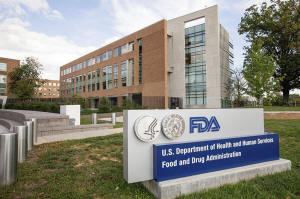FDA's new expert panels are rife with financial conflicts and fringe
views
[August 19, 2025]
By MATTHEW PERRONE
WASHINGTON (AP) — When the Food and Drug Administration needs outside
guidance, it normally turns to a trusted source: a large roster of
expert advisers who are carefully vetted for their independence,
credentials and judgment.
But increasingly, the agency isn’t calling them.
Instead, FDA Commissioner Marty Makary has launched a series of ad hoc
“expert panels” to discuss antidepressants, menopause drugs and other
topics with physicians and researchers who often have contrarian views
and financial interests in the subjects.
Former agency officials worry the meetings are skirting federal rules on
conflicts of interests and transparency, while promoting fringe
viewpoints that align with those of Health Secretary Robert F. Kennedy
Jr.
“These meetings are a chance to advance RFK's pet peeves — talc,
antidepressants, fluoride — with people who have been handpicked,” said
Dr. Peter Lurie, a former FDA official who is now president of the
Center for Science in the Public Interest. “Nobody would put forward
these panels as representing the general scientific opinion on these
topics.”
A spokesperson for Kennedy did not answer specific questions about the
panels, but said they represent an effort to “apply rigorous,
evidence-based standards to ingredient safety and modernize regulatory
oversight.”
The panels kicked off in May with a meeting on talc, the soft mineral
sometimes added to makeup, baby powder and other consumer goods. The
meeting echoed thousands of lawsuits alleging talc has contributed to
ovarian cancer and other illnesses, and included two experts who
testified in those cases.

Under FDA regulations, the ingredient is still considered safe when
carefully tested for the presence of asbestos. And federally funded
studies haven't shown a link to cancer.
A July meeting on the safety of antidepressants during pregnancy also
featured doctors who have testified in class action lawsuits, alongside
other experts who allege the drugs cause autism, birth defects and other
conditions — links that are not supported by science.
The meeting concluded with all but one of the experts calling for a new
boxed warning — the most serious type — about antidepressant risks for
mothers and developing babies.
A meeting on estrogen-based drugs for menopause took the opposite
approach: Experts urged the removal of a long-standing warning.
Most of the physicians at that meeting prescribe the hormones or are
involved with a pharmaceutical industry campaign opposing the warning
label.
Nearly 80 researchers sent a letter to the FDA this month objecting to
the “two-hour meeting of hormone proponents” and calling for an official
advisory committee meeting.
Advisory panels operate under strict rules
The FDA has more than 30 panels composed of experts specializing in
various drugs, vaccines, food ingredients and other products.
Their meetings are subject to strict government transparency rules in
terms of scheduling, panel composition and disclosure of any financial
conflicts. A comment period open to the public is also required.
Additionally, FDA scientists usually publish a detailed memo explaining
their position on the topic.
The latest FDA meetings haven’t included those elements.
Former FDA lawyers say the agency could expose itself to legal
challenges if it tries to use Makary's informal panels as the basis for
regulatory decisions.

But that may not be the aim of the meetings.
“They seem more designed as a forum to put a stamp of approval on
predetermined opinions,” said Genevieve Kanter, a health policy
specialist at the University of Southern California. “The information in
these panels could be used in litigation and presented as coming from
experts or representing some intellectual consensus that doesn’t exist.”
Antidepressants meeting aired unfounded claims
Antidepressants have long been a target of Kennedy, an attorney and
outspoken critic of pharmaceutical companies. During his confirmation
hearings he suggested, without evidence, that the drugs contribute to
school shootings.
[to top of second column]
|

The U.S. Food and Drug Administration campus in Silver Spring, Md.,
is photographed on Oct. 14, 2015. (AP Photo/Andrew Harnik, File)
 The FDA’s recent session cataloged
many unsubstantiated theories about the drugs, often based on animal
studies, including that they contribute to autism, birth defects and
miscarriages.
Several participants had served as expert witnesses against
drugmakers, including in lawsuits alleging that they cause homicidal
behavior. All but one of the other panelists have criticized the
drugs in books, articles, interviews or other forums.
“It’s never been possible to identify a group of people who do
particularly well on antidepressants,” said Dr. Joanna Moncrieff, a
British psychiatrist, author and co-founder a group critical of
mainstream psychiatric medicine.
The American College of Obstetricians and Gynecologists called the
panel “alarmingly unbalanced” and full of “outlandish and unfounded
claims.”
Antidepressants carry pregnancy warnings about risks of excess
bleeding and lower birth weight for newborns.
But psychiatric experts say those risks are far outweighed by the
well-documented harms of untreated depression in mothers, which can
lead to pregnancy complications, substance abuse and suicide.
“I tell people I’m working with that the best thing they can do for
themselves and their baby is to get the treatment that they need,”
said Dr. Nancy Byatt of University of Massachusetts' Chan Medical
School.
Financial conflicts at menopause meeting
FDA has not disclosed how panelists were selected for the meetings.
Last month's session on hormone therapies for menopause included
doctors who consult for drugmakers or promote the medications in
their practices.
The views they expressed largely echoed those of Makary, who has
argued that current warning labels overstate hormone therapy risks
and don’t reflect possible benefits for some women, such as reducing
heart disease and cognitive decline.
“Hormone replacement therapy for women is basically a modern-day
miracle,” Makary told a podcast host last year.

But guidance from the FDA and other top federal authorities
specifically advises against using the drugs to prevent chronic
conditions due to a lack of clear benefit. The drugs are only
FDA-approved for specific menopause symptoms, including hot flashes.
Discussions around hormone therapy reflect ongoing debate about a
landmark study of two different hormone regimens in more than 26,000
postmenopausal women. The research was halted more than 20 years ago
because scientists discovered that the risk of serious health
problems outweighed the benefits. All estrogen drugs still carry
boxed warnings about the higher rates of stroke, blood clots and
cognitive problems among women taking the medications.
But some doctors — including those at FDA’s meeting — say the
warnings are exaggerated and should be removed from at least some
products, such as low-dose creams typically used for vaginal
dryness. Makary raised the possibility of also removing the warning
from higher-dose pills, patches and sprays.
It’s unclear whether the FDA will move ahead with those changes or
heed calls for an official advisory meeting — a step that Kennedy's
critics say would be in keeping with his pledge for “radical
transparency.”
“If you really wanted to be transparent about these issues you’d put
together a balanced panel of experts, who have been carefully
screened for conflicts and you’d invite the public in,” Lurie said.
“But that’s the antithesis of what’s going on in these cases.”
___
The Associated Press Health and Science Department receives support
from the Howard Hughes Medical Institute’s Science and Educational
Media Group and the Robert Wood Johnson Foundation. The AP is solely
responsible for all content.
All contents © copyright 2025 Associated Press. All rights reserved |